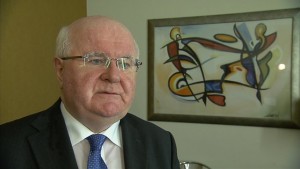
By editor - 07 March, 2016

Fr Sean Healy. Pic: RTE
Fr Sean Healy of Social Justice Ireland addressed COMECE’s bishops last week as they debated the theme of EU as a peace project.
In his presentation, the Irish priest shared his theological and ethical reflection on the value of peace, and summed it up with a quote from the Old Testament: “Where there is no vision, the people perish” (Proverbs 29:18).
Peace and security policies were at the centre of the debate of the spring plenary assembly of COMECE in Brussels.
The COMECE bishops emphasised the vocation of the EU to build peace in the world.
At the opening of the Assembly, the President of COMECE, Cardinal Reinhard Marx, stated in the context of armed conflicts in the neighbouring countries of Europe and the resulting flow of refugees that “The question of peace is more important than ever.”
“We need […] to reflect on how […] Europe can be a constructive actor for peace in the world, particularly in its immediate neighbourhood in the Middle East and in North Africa but also in Ukraine.”
During the day devoted to the study of the theme ‘Europe’s vocation to promote peace in the world’ on Thursday 3 March, the bishops met Anna Elzbieta Fotyga, Chair of the Subcommittee on Security and Defence of the European Parliament.
They discussed the new security challenges and the geopolitical situation at the Southern borders of the EU, especially in Syria, Iraq and the Middle East.
The bishops’ Assembly expressed its belief that a coherent European peace policy must be founded on the fundamental values of the Union.
In addition, a vision and a strategy for its implementation are needed.
The Director for Europe and Central Asia at the European External Action Service (EEAS), Thomas Mayr-Harting, then debated with the bishops the geopolitical situation at the Eastern borders of the EU and the developments in Ukraine, Russia, Moldova and Belarus.
Federica Mogherini, EU High Representative for Foreign Affairs and Security Policy, was also a guest at the Plenary Assembly, and insisted that dialogue and reconciliation at national and regional level are indispensible elements of successful peace-building.
She was of the view that Churches can play a crucial role in preventing radicalisation.
Ms Mogherini expressed her wish to enter into an open dialogue with Churches, to engage in an exchange of ideas and to collaborate on developing toolkits.
In this respect she would also like to ensure that the Guidelines on Freedom of Religion or Belief are properly implemented.
At the close of the study day, the bishops received and adopted a report on Europe’s Vocation to Promote Peace in the World, prepared by the joint COMECE/Justice & Peace Europe Commission.
The report makes a series of specific recommendations on EU External Action.
It will be published in March 2016 as a contribution of COMECE to the reflection process on the forthcoming EU Global Strategy on Foreign and Security Policy.
The migration and refugee crisis also received the bishops’ attention on Friday 4 March.
The COMECE coordinator for refugees, migration and integration, Bishop Ägidius Zsifkovics, informed the bishops on the results of the conference held mid-February in Heiligenkreuz which brought together bishops from the countries of origin, transit and reception of refugees.
Speaking ahead of today’s meeting between the European Council and Turkey, Cardinal Marx said, “I sincerely hope that the leaders who meet in Brussels on Monday set an example of solidarity and make it clear that the EU is capable of taking action. That would be a vital sign of hope, also for the public debates currently taking place in Europe.”